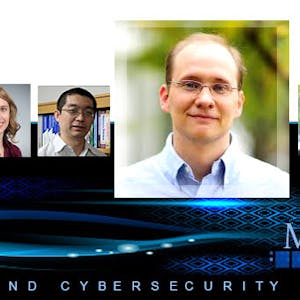This course on Cryptography offered by University of Maryland, College Park, delves into the foundations and practical applications of modern cryptography. The course covers a range of topics including perfect secrecy, computational secrecy, pseudorandomness, encryption modes, message integrity, number theory, public-key encryption, digital signatures, and SSL/TLS.
The course comprises seven modules, each consisting of detailed video lectures, programming assignments, quizzes, and practical insights to reinforce learning.
Upon completion, students will possess a strong foundation in modern cryptography, enabling them to apply cryptographic principles to real-world scenarios and contribute to secure communication and data protection.
Certificate Available ✔
Get Started / More Info
The Cryptography course encompasses seven modules that cover foundational principles and practical applications of modern cryptography, including perfect secrecy, computational secrecy, encryption modes, public-key encryption, digital signatures, and SSL/TLS.
This module provides an introduction to the course, covering topics such as the Vigenere Cipher, principles of modern cryptography, perfect secrecy, and the one-time pad. The module includes programming assignments and quizzes to reinforce learning.
Module 2 explores the limitations of the one-time pad, computational secrecy, pseudorandomness, and proofs of security. It also includes programming assignments and quizzes to test understanding and application of concepts.
Module 3 delves into stronger security notions, pseudorandom functions, block ciphers, encryption modes, and security against chosen-ciphertext attacks. Students will engage in programming assignments and quizzes to reinforce their knowledge.
Module 4 focuses on message integrity, fixed-length MAC, CBC-MAC, hash functions, HMAC, and authenticated encryption. It also includes practical programming assignments and quizzes to reinforce learning.
Module 5 covers number theory and its relevance to cryptography, including topics such as number theory, public-key encryption, and RSA-based public-key encryption. Students will engage with quizzes to test their understanding.
Module 6 explores the public-key revolution, Diffie-Hellman key exchange, public-key encryption, RSA-based public-key encryption, and discrete-log-based public-key encryption. Quizzes are included to test understanding.
Module 7 focuses on digital signatures, identification schemes, public-key infrastructure (PKI), SSL/TLS, and practical applications. Students will also complete programming assignments and quizzes to reinforce their knowledge.
Blockchain Revolution in Financial Services is a four-course specialization introducing learners to the revolutionary world of blockchain technology for financial...
Introduction to Cybersecurity & Risk Management is a case-based Specialization providing foundational concepts of security governance and risk management, focusing...
Play It Safe: Manage Security Risks is a crucial course in the Google Cybersecurity Certificate program, delving deeper into risk management, security frameworks,...
Applied ChatGPT for Cybersecurity is an immersive course that utilizes ChatGPT for hands-on SOC analyst and incident response work, empowering novices to delve into...